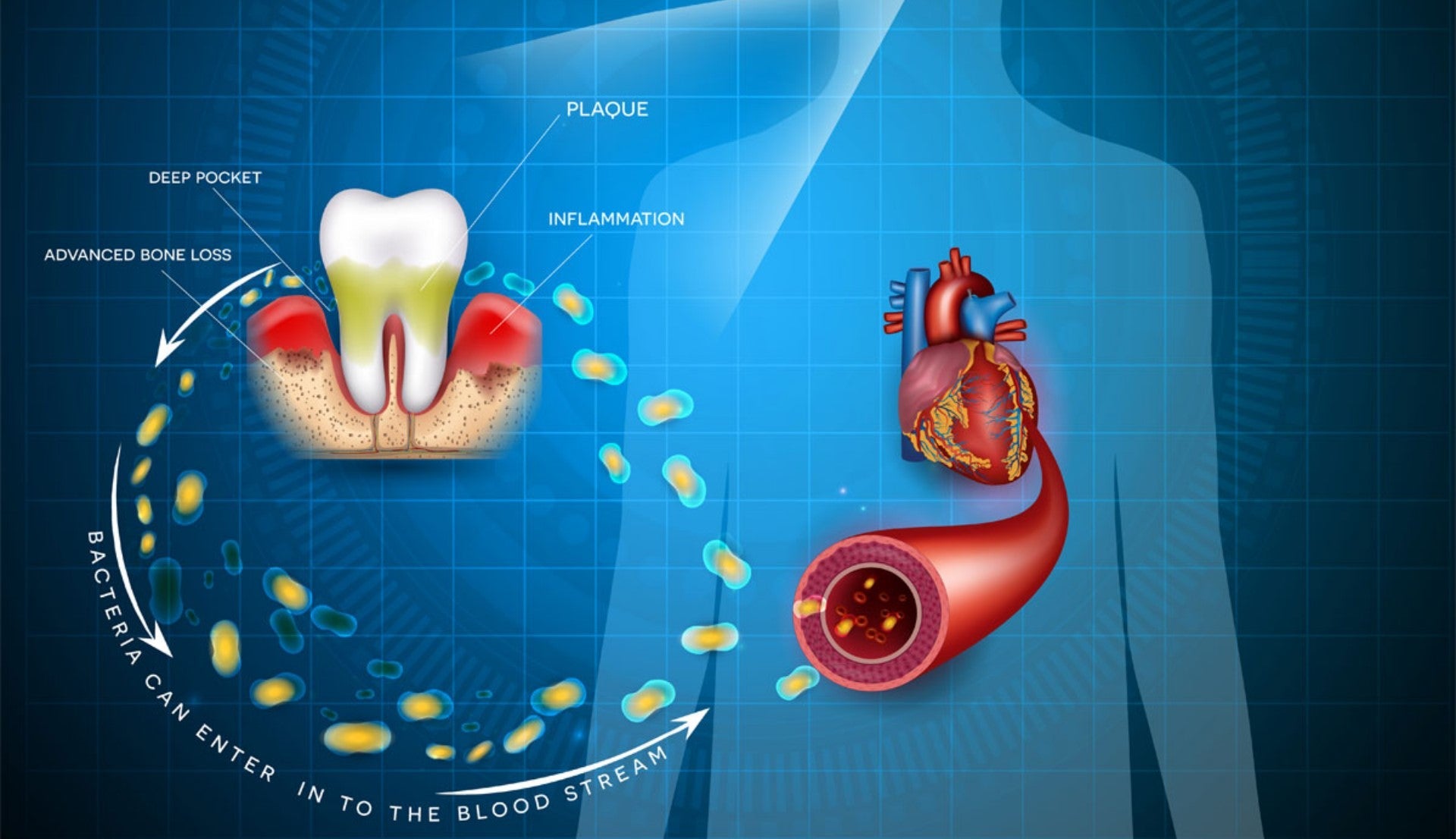People with gum disease are 28% more likely to suffer a heart attack than those without dental problems. Wondering why is gum disease linked to the heart? Well, most people think gum disease just means bleeding gums, bad breath, and maybe a few missing teeth later in life. But the reality is far more serious.
Your gums are not only the soft tissue which holds your teeth in the jaws, they form a complex system that communicates with the rest of your body. And when that system becomes inflamed or gets infected, your heart is the one which pays the price.
Researchers have been examining the gum-heart relationship over decades and the evidence is obvious; oral health is indeed linked to cardiovascular health.
When you neglect your bleeding gums, it is not only your smile that you are potentially putting in danger, you could actually be endangering your life too.
Gum Disease is More Than Just a Mouth Problem
Now, before we get all into the gum disease-heart connection, we need to get one thing straight here, gum disease is not only confined to damaging your mouth area only - the inflammation is capable of disturbing your whole body as well.
Gingivitis vs. Periodontitis
- Gingivitis is the early, reversible stage of gum disease. It’s marked by redness, swelling, and bleeding gums.
- Periodontitis is the advanced stage, where infection damages the bone and connective tissue holding your teeth in place.
From Plaque to Pain: The Early Stages You Don’t See
It starts with plaque; a sticky film of bacteria that forms after you eat. If not removed through brushing and flossing, plaque hardens into tartar. This irritates your gums, triggering inflammation. Left unchecked, the infection digs deeper, damaging the jawbone and creating open gateways for bacteria to enter your bloodstream.
And that’s when the heart comes into play.
Why is Gum Disease Linked to the Heart?
The short answer: inflammation and bacteria.
The long answer: gum disease creates a perfect storm inside your body - and unfortunately, your cardiovascular system is caught in the middle.

Bacteria Crossing the Barrier
When a person has gum disease, the gums get irritated, bulge, and might bleed too. This implies that the barrier (between your mouth and bloodstream) is damaged. Dangerous bacteria, including Porphyromonas gingivalis or Tannerella forsythia, get through this barrier in the course of normal activities, such as chewing or brushing.
When these bacteria get into the blood stream, they do not idly swim about. They may latch on fatty deposits, which line the artery - and lead to Atherosclerosis (hardening and thickening of arteries). This may limit the flow of blood, and over time, raise the chances of a clot developing. A clot at the wrong place e.g., a coronary artery may catalyze a heart attack.
The Inflammation Link
Gum disease is not only a local infection, but it is a chronic inflammatory disease. Your body reacts to oral bacteria by dispatching immune cells and inflammatory agents such as C-reactive protein (CRP). These markers flow in the body and have the ability to destroy the lining of the blood vessels, which makes them susceptible to the buildup of the plaque.
Inflammation is like an overzealous security guard; meant to protect, but capable of causing collateral damage when left unchecked. In the case of gum disease, your heart becomes one of the unintended victims.
Shared Risk Factors Make the Connection Stronger
Why is gum disease linked to the heart disease so consistently across studies? Because they share many of the same risk factors:
- Smoking.
- Poor diet.
- Uncontrolled diabetes.
- Chronic stress.
- Sedentary lifestyle.
If you have gum disease, there’s a good chance at least one of these factors is also affecting your heart health.
The Feedback Loop You Don’t Want
One of the more troubling findings in recent research is that the relationship between gum disease and heart disease can become a vicious cycle. Gum disease increases inflammation, which damages arteries, which reduces blood flow, and reduced circulation can, in turn, worsen gum health by depriving tissues of oxygen and nutrients.
It’s like a bad partnership between two troublemakers, each one making the other stronger and more dangerous.
Not Just Theory, Real-World Proof
Decades ago, scientists suspected there was a connection, but the evidence was shaky. Now, large-scale studies clearly show that people with periodontal disease are significantly more likely to experience cardiovascular events, even after adjusting for age, smoking, and other health issues.
In other words, gum disease isn’t just a side effect of poor health - it’s an active player in the development of heart problems.
The Role of Inflammation: Your Body’s Double-Edged Sword
Inflammation is your body’s built-in defense system; a natural way of responding to injury or infection. Think of it like a fire department rushing to put out a blaze. For short-term problems, it works beautifully. But with gum disease, the fire never fully goes out… and those firefighters end up doing more harm than good.
Acute vs. Chronic Inflammation
- Acute inflammation is helpful - like when you cut your finger and it gets red and swollen for a few days while healing.
- Chronic inflammation, on the other hand, lingers for weeks, months, or even years. That’s what happens with gum disease. The immune system is constantly active, releasing chemicals that, over time, start damaging healthy tissues instead of just targeting the bacteria.
How Inflammation Damages the Heart
When your gums are inflamed, certain chemicals, including C-reactive protein (CRP), interleukins, and tumor necrosis factor-alpha (TNF-α) enter your bloodstream. These substances irritate and damage the inner lining of blood vessels (the endothelium), making it easier for cholesterol to stick and form artery-clogging plaques.
Once plaques start to develop, inflammation makes them unstable. A sudden rupture in one of these plaques can create a blood clot, which can block blood flow to the heart (heart attack) or brain (stroke).
Why Your Immune System Overreacts
The tricky part is this: when there is chronic inflammation, your immune system cannot distinguish between dangerous bacteria and other harmless participants. Such an exaggerated response may cause a system-wide inflammatory condition, which preconditions cardiovascular disease in a silent manner.
The Inflammation–Bacteria Combo
Bacteria are bad enough. Inflammation is bad enough. But together? They’re a dangerous duo. The bacteria from gum disease keep triggering inflammation, and the inflammation makes it easier for bacteria to damage blood vessels.
This is why many cardiologists now view gum disease not as a separate dental problem, but as part of a larger inflammatory condition affecting the whole body.
Can You Reverse the Damage?
The good news is that the inflammation caused by gum disease can be minimized, even significantly - through the right kind of treatment. It involves regular dental care, regular oral care, and anti-inflammatory help that diet and natural products such as The Goodbye Company Gum Disease can provide.
Reducing the inflammation in your gums will not only save your smile, it will take some of the pressure off your heart as well.
Bacteria on the Move: How Oral Microbes Reach the Heart
You might think bacteria from your mouth wouldn’t stand a chance making it to your heart, but the journey is surprisingly easy for them.
Why Your Gums Are a Gateway to Your Heart
When gums are swollen and bleed during brushing or flossing, microscopic tears open the door for bacteria to slip into the bloodstream. From there, they hitch a ride on blood cells and travel straight to vital organs, including the heart.
Some bacteria can even disguise themselves, tricking the immune system into ignoring them until they’ve already done significant damage inside your arteries.

Risk Factors That Make the Connection Worse
The gum–heart link is strong, but certain lifestyle factors make the situation even riskier.
|
Risk Factor |
How it Affects Gums |
How it Affects Heart Health |
|
Smoking |
Reduces blood flow to gums |
Damages arteries, raises BP |
|
Diabetes |
Weakens gum tissue immunity |
Increases heart disease risk |
|
Poor Diet |
Promotes plaque buildup |
Raises cholesterol, clogs arteries |
|
Chronic Stress |
Weakens immune system |
Raises blood pressure |
|
Aging |
Slower gum healing |
Stiffer arteries |
Addressing these factors isn’t just good for your gums - it’s a long-term investment in your cardiovascular health.
Red Flag Signs Your Gums Are in Trouble
One of the most dangerous aspects of gum disease is how quietly it develops. Many people don’t realize they have it until it’s advanced.
Bleeding After Brushing or Flossing
If your gums bleed regularly, don’t write it off as “normal.” Healthy gums don’t bleed easily.
Chronic Bad Breath
Persistent bad breath can be a sign of bacterial overgrowth.
Swollen, Tender Gums
Inflammation in the gums often means bacteria are thriving below the surface.
Tooth Sensitivity
When gums recede, the sensitive roots of your teeth become exposed, leading to pain when eating hot or cold foods.
Your Gum-Heart Protection Plan
If you want to lower your risk of both gum disease and heart disease, prevention is your best friend.
Daily Habits That Shield Your Smile and Heart
- Brush Twice Daily: Use fluoride toothpaste and a soft-bristled brush.
- Floss Every Day: This removes plaque from places your toothbrush can’t reach.
- Eat for Oral Health: Leafy greens, nuts, and fatty fish reduce inflammation.
- Visit Your Dentist: Regular check-ups catch problems early.
And here’s something worth adding to your routine: The Goodbye Company Gum Disease oral care solution.
The Goodbye Company Gum Disease: A Natural Ally
If you currently suffer from poor oral health - bleeding gums, tooth pain, or sensitivity to hot or cold, it’s time to act. The Goodbye Company Gum Disease is an all-natural preventative and therapeutic solution designed to target gum inflammation at its source.
It’s infused with Omega 3 and 9 oils, plus neem and clove essential oils - ingredients known for their antimicrobial and anti-inflammatory properties. This means you’re not just cleaning your mouth; you’re creating an environment where harmful bacteria can’t thrive.
When you combine daily brushing, flossing, and a healthy diet with this natural formula, you’re giving both your gums and your heart the best chance at long-term health.
The Latest Research on the Gum-Heart Connection
In recent years, research has moved from speculation to solid evidence. Large-scale studies, including data from the American Heart Association, now confirm that treating gum disease can lower systemic inflammation and potentially reduce heart disease risk.
Some cardiologists even include gum health checks as part of heart disease prevention plans. That’s how interconnected these systems are.
FAQs - Why is Gum Disease Linked to the Heart?
How does gum disease cause heart problems?
Bacteria from infected gums enter the bloodstream, contributing to artery plaque buildup and inflammation, both of which increase heart disease risk.
Can treating gum disease lower heart attack risk?
Yes. Reducing oral inflammation can lower systemic inflammation, which is linked to cardiovascular problems.
Is gum disease more dangerous for people with existing heart problems?
Absolutely. If you already have narrowed arteries, bacteria from gum disease can accelerate plaque buildup.
How long does it take for gum disease to affect the heart?
It varies. Chronic gum disease over years significantly raises cardiovascular risk, but even short-term inflammation can impact arterial health.
Can natural remedies help prevent gum disease?
Yes, especially when paired with good oral hygiene. Products like The Goodbye Company Gum Disease oral solution offer a natural, non-invasive way to support gum health.
Outlook
Why is gum disease linked to the heart? The science points to bacteria, inflammation, and shared risk factors. But the bigger message is this: your mouth is not separate from your body. Neglecting your gums isn’t just a dental mistake - it’s a cardiovascular one.
Start small. Brush and floss daily. Eat an anti-inflammatory diet. And for an extra layer of protection, work The Goodbye Company Gum Disease oral solution into your oral care routine. Your gums will thank you. Your heart will, too.














